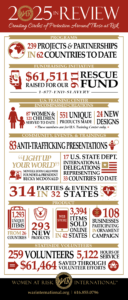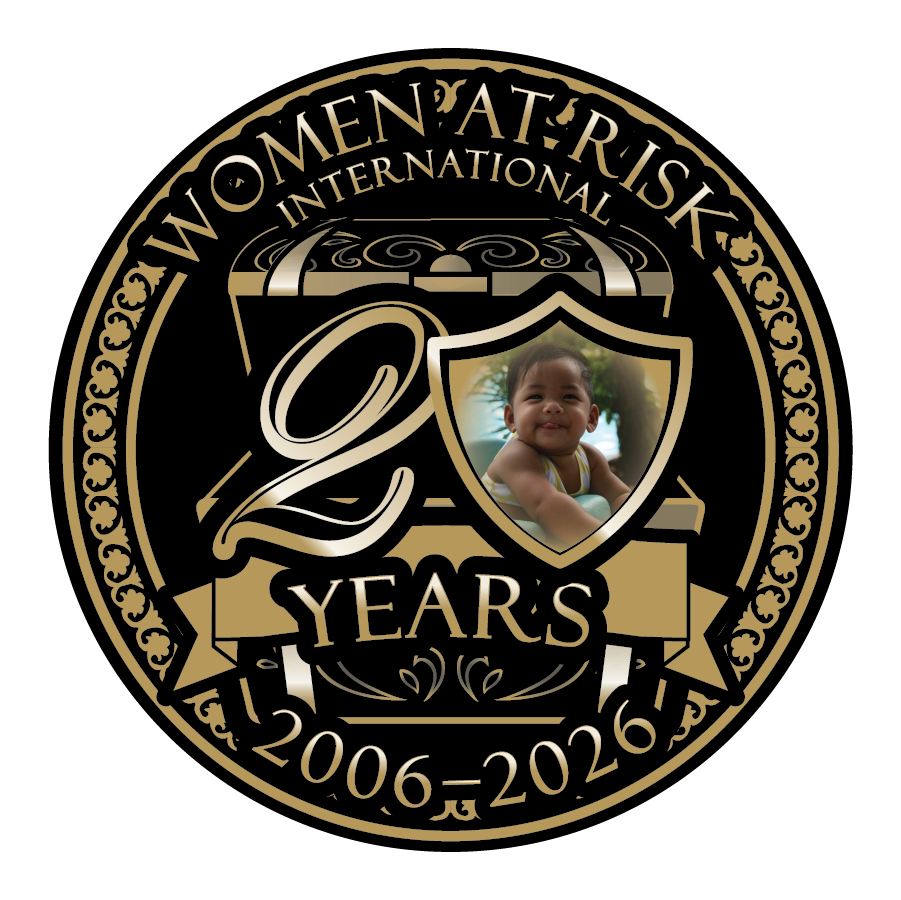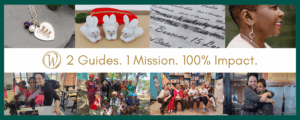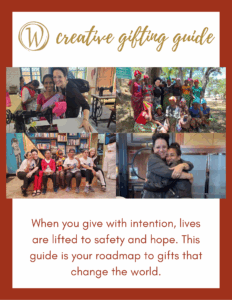
By Becky McDonald, Founder & President
-January 2026
2025 was a year of quietly building the House of WAR. You can peek into its “rooms” and see growth. When I think of a home, I think of the rooms we inhabit telling the story of who we are and what we cherish. If you looked into the House of WAR, what would you see?
Lobby: Featuring beautiful floors, a chandelier, and furniture from around the world,this intentional “look” extends through the building. We want to portray thosewe represent exactly as they are—beautiful and awe-inspiring. One survivorwalked through our doors and with tears whispered, “You make us look sobeautiful!” Indeed, it’s our goal to take brokenness and restore the beautythat once was and, in truth, still is.
Kitchen: With three kitchen spaces, there’s usually a plethora of snacks we share to celebrate community. We delight in holding “teas,” banquets, and more. Food is a tangible expression of the value we place on spending time in safe places with those in our circles.
Volunteer Center: We delight in volunteers all over the WAR world who help tell the story and keep costs down. We will continue dreaming and growing this vital piece of our mission in 2026.
U.S. Training Center: This room is a sacred space for rescued and at-risk Americans to healand work with dignity. They can work in this safe space or take work home to watch their babies while doing piecework. This room also holds conferences,banquets, and trainings, and it exists to do what we do: rescue, restore, andempower. It is where we host U.S. State Dept. international delegations totrain in how we fight risk. And it is here you can peek into the “windows” of our Rescue 911 line that has helped rescue precious lives, recently including twofrom our home state.
The Staff of WAR embrace uncertainty and tirelessly lift the broken, faithful even when theirown lives are wracked by loss and worry. They are a community to the least ofthese and to each other out of loyalty to a greater cause. Together, lights kept burning, emergency phone lines stayed open, missing kids were found,families reunited, partners encouraged, customers attended, and funds raised. In the face of chaos, they do not run, hide, or fear, but embrace risk with apassion to be a circle of protection. I salute these unsung heroes. They made 2025 a success!
Accounting Wing: WAR family, you grew the House of WAR against a ll odds. Like the widow’s oil that never ran out, God multiplied every gift. Debt free, we raised funds to do amazing rescues both locally and globally, allowing for immediate intervention. This allowed us to be strong for the weak, brave for the threatened, and lift those at the brink of disaster—accomplishing the seemingly impossible. God has grown the House of WAR with the goal of being the Safest Place on Earth.
Proverbs 24:3-4 says, “By wisdom a house is built, and through understanding it is established; through knowledge its rooms are filled with rare and beautiful treasures.” The Master Designer built the House of WAR, beautifying its inner chambers with the colors of His celestial brush. But by far, the greatest treasures of WAR, Int’l are the men,women, and children who have been rescued, redeemed, restored, andempowered to walk with dignity and worth as beauty shines through their lives.




